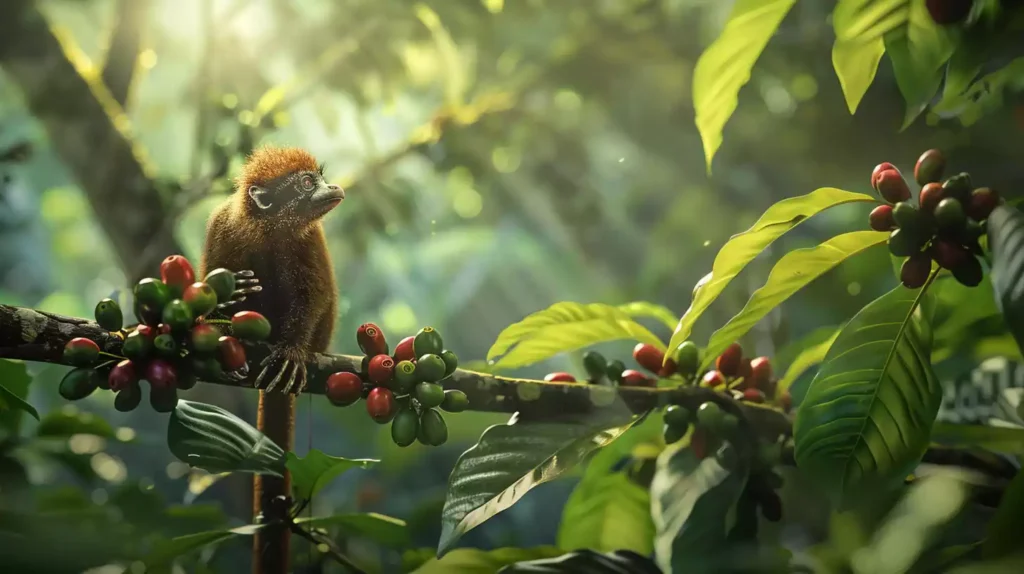The Luwak, or civet, plays a crucial role in the journey of coffee from jungle to cup. In the lush tropical forests of Southeast Asia, Luwaks selectively consume ripe coffee cherries, whose sugars and compounds significantly enhance flavor. Their unique digestive process transforms the beans, resulting in a rich, smooth coffee noted for its complex flavor profile.
However, the ethical treatment of these animals raises concerns, highlighting the importance of sustainable practices. Understanding the Luwak’s contribution to coffee not only deepens appreciation but also reveals the intricate relationship between nature and our favorite beverage.
Quick Summary
- Luwaks inhabit tropical forests and coffee-growing regions, playing a crucial role in the ecosystem by selecting ripe coffee cherries.
- Their unique digestion process transforms coffee cherries, enhancing flavor through fermentation and enzymatic action, leading to distinct taste characteristics.
- The beans, once excreted, carry a unique earthy aroma and are carefully processed and roasted to develop their full flavor potential.
- Ethical considerations arise from civet treatment in captivity, emphasizing the need for sustainable and humane sourcing of Luwak coffee.

The Luwak’s Habitat
The Luwak, also known as the civet cat, primarily inhabits tropical forests and coffee-growing regions of Southeast Asia, particularly in countries such as Indonesia, the Philippines, and Vietnam.
This nocturnal mammal has adapted well to its environment, thriving in the dense canopies and underbrush of these lush landscapes. The presence of coffee plantations is particularly significant, as the Luwak plays a crucial role in the local ecosystem.
Luwaks are arboreal, spending a considerable amount of time in trees, which provide both shelter and a diverse diet.
Their primary food source consists of ripe coffee cherries, along with various fruits, insects, and small animals. The ability to select the ripest cherries is notable, as this selection process contributes to the unique flavor profile of Luwak coffee.
The habitat of the Luwak is increasingly threatened by deforestation and the expansion of agricultural land, which poses a risk to their population and the delicate balance of the ecosystem.
Conservation efforts are essential to protect these animals and their habitats, ensuring the sustainability of Luwak coffee production and the preservation of biodiversity in the region.
Coffee Cherry Selection
Known for their discerning palate, Luwaks selectively choose the ripest coffee cherries, a process that significantly influences the quality and flavor of the coffee produced from their digested beans. This remarkable selection is not merely instinctual; it reflects their innate ability to identify cherries that are at peak maturity, characterized by their vibrant color and optimal sugar content.
The Luwak’s preference for fully ripened cherries is crucial, as these fruits contain higher levels of sugars and aromatic compounds, which contribute to the overall flavor profile of the resultant coffee. By consuming only the finest cherries, Luwaks play a pivotal role in the initial stages of coffee production, ensuring that the beans they digest are of superior quality.
This selective feeding behavior impacts the genetic diversity of coffee plants in their environment. As Luwaks traverse their habitats, they inadvertently facilitate the distribution of coffee seeds, promoting healthy growth in new locations. This symbiotic relationship emphasizes the importance of Luwaks in maintaining the integrity and richness of coffee cultivation, highlighting their essential role in the journey from cherry to cup.
Digestive Process Explained
A complex digestive process transforms the selected coffee cherries as they pass through the Luwak’s gastrointestinal system, resulting in a unique flavor profile in the beans.
The Luwak, primarily feeding on ripe cherries, begins this transformative journey by chewing the fruit. The enzymes in its saliva initiate the breakdown of sugars, enhancing the cherries’ inherent sweetness.
Once ingested, the cherries travel through the Luwak’s stomach, where gastric acids further decompose the fruit’s cellular structure. This process allows for the extraction of beneficial compounds, including the essential oils and acids that contribute to flavor.
The cherries then proceed to the intestines, where the Luwak’s microbiome plays a crucial role. Bacteria within the gut continue to ferment the beans, further modifying their chemical composition.
The undigested coffee beans are then excreted, encased in a layer of fecal matter. This unique digestive process not only aids in flavor development but also imparts a distinct earthy aroma, distinguishing Luwak coffee from other varieties.
The interplay of enzymatic activity and fermentation within the Luwak’s digestive tract is fundamental to producing this sought-after beverage.
Bean Transformation
The transformation of coffee beans in the Luwak process begins with the unique digestion of the civet, which influences the beans’ flavor profile.
This intricate process not only enhances the organoleptic qualities of the coffee but also necessitates meticulous harvesting and processing techniques to ensure the highest quality product.
Understanding these aspects is important for truly appreciating the intricacies of Luwak coffee.
Luwak Digestion Process
Luwak coffee undergoes a unique transformation during the civet’s digestion process, where the beans are fermented and altered by digestive enzymes before being excreted. This remarkable process contributes to the coffee’s distinctive characteristics, setting it apart from traditional methods of coffee processing.
During digestion, several key transformations occur:
- Fermentation: The beans undergo microbial fermentation, breaking down proteins and sugars.
- Enzymatic Action: Digestive enzymes modify the chemical composition of the beans, enhancing certain flavor precursors.
- Removal of Mucilage: The civet’s digestive system efficiently removes the mucilage coating from the beans, which can impact flavor.
- Physical Alteration: The beans are subjected to pressure and movement within the digestive tract, contributing to their final shape and texture.
- Nutrient Absorption: The civet absorbs some nutrients from the beans, which may influence the final quality of the excreted product.
These factors collectively contribute to the unique characteristics of Luwak coffee, influencing its subsequent processing and brewing methods.
Flavor Profile Development
Following the unique digestion process, the transformation of Luwak coffee beans continues to develop a distinctive flavor profile characterized by complex notes and a smooth finish.
This transformation is primarily influenced by the enzymatic activity within the Luwak’s digestive system, which breaks down certain compounds in the coffee cherries, notably chlorogenic acids. As these compounds are altered, the resulting beans showcase reduced acidity and enhanced sweetness, contributing to a well-balanced taste.
The fermentation process that occurs during digestion also plays a critical role in flavor development. The interaction between the beans and the Luwak’s digestive enzymes leads to the emergence of unique flavor characteristics that often include hints of chocolate, caramel, and tropical fruits.
These complex notes can vary significantly based on the individual animal’s diet, which consists of ripe coffee cherries and other fruits.
The subsequent exposure of the beans to environmental factors in the wild, such as humidity and temperature, further enriches their flavor profile.
The combination of these natural processes creates a coffee that is celebrated for its depth and richness, making Luwak coffee a sought-after delicacy among connoisseurs.
Harvesting and Processing
Harvesting Luwak coffee beans requires meticulous attention to ensure the preservation of their unique qualities, beginning with the careful selection of ripe cherries from the forest floor.
The process starts with the Luwak, a civet-like animal, which consumes only the best coffee cherries. Once excreted, these cherries undergo a detailed harvesting and processing procedure that highlights their exceptional characteristics.
Key steps in the harvesting and processing include:
- Ripe Cherry Selection: Only the cherries that exhibit optimal ripeness are collected to maximize flavor potential.
- Fermentation: The beans undergo a natural fermentation process during digestion, enhancing their flavor profile.
- Washing: After collection, the beans are thoroughly washed to remove any residual fruit material and impurities.
- Drying: The washed beans are sun-dried to reduce moisture content, crucial for preserving flavor and preventing spoilage.
- Roasting: The beans are then carefully roasted to develop their full aromatic complexity, ensuring a distinctive cup of coffee.
This meticulous process underscores the art and science involved in transforming the humble coffee cherry into the exquisite Luwak coffee enjoyed by connoisseurs worldwide.
Ethical Considerations

Considering the controversial practices surrounding the production of Luwak coffee, ethical considerations play a crucial role in assessing its impact on animal welfare and environmental sustainability.
The primary concern arises from the treatment of civets, the animals responsible for the unique processing of the coffee beans. In many commercial operations, civets are kept in cramped cages, deprived of their natural behaviors and environments. This captivity not only raises serious animal welfare issues but also questions the integrity of the product itself.
The environmental impact of Luwak coffee production cannot be overlooked. The demand for this specialty coffee has led to increased deforestation and habitat destruction as farmers expand their plantations to meet market needs. This practice jeopardizes biodiversity and contributes to the decline of the civet population in the wild.
To address these ethical concerns, consumers and producers alike must prioritize sourcing Luwak coffee from farms that practice sustainable and humane treatment of civets.
Certifications and transparency in farming practices are essential to ensure that the production of Luwak coffee aligns with ethical principles, thereby fostering a more responsible coffee industry that respects both animal welfare and environmental integrity.
Flavor Profile of Luwak Coffee
The flavor profile of Luwak coffee is renowned for its unique characteristics, often described as smooth and rich, with a complex blend of earthy, fruity, and chocolatey notes that can vary significantly based on the civet’s diet and the processing techniques employed.
This complexity results from the fermentation process that occurs in the civet’s digestive system, transforming the coffee beans.
Key elements that contribute to the flavor profile include:
- Earthy Undertones: A robust base that provides depth, often reminiscent of forest floor aromas.
- Fruity Accents: Bright, citrus-like flavors that can range from berry sweetness to tropical fruit notes.
- Chocolatey Finish: A lingering sweetness akin to dark chocolate, enhancing the overall richness.
- Smooth Mouthfeel: A velvety texture that elevates the drinking experience, minimizing bitterness.
- Subtle Spiciness: Occasionally, a hint of spice may emerge, adding an intriguing layer to the flavor.
These factors combine to create a distinct cup of Luwak coffee that is sought after by connoisseurs and casual drinkers alike, making it a unique offering in the world of specialty coffees.
Economic Impact
The economic impact of Luwak coffee is multifaceted, offering local communities unique livelihood opportunities through its cultivation and production.
The promotion of sustainable farming practices plays a crucial role in enhancing environmental stewardship while meeting the increasing global market demand for this specialty beverage.
Understanding the dynamics at play is helps to appreciate the broader implications of Luwak coffee, both on local economies and the global marketplace.
Local Livelihood Opportunities
Generating income through the cultivation and processing of Luwak coffee has become a vital source of livelihood for many local communities. The unique production process, involving the Luwak animal, not only yields a premium product but also creates diverse economic opportunities that support local economies.
Key economic impacts include:
- Job Creation: Employment opportunities arise in various sectors, including farming, processing, and marketing of Luwak coffee.
- Increased Income: Farmers often receive higher prices for Luwak coffee compared to conventional coffee, leading to improved household incomes.
- Local Entrepreneurship: The popularity of Luwak coffee encourages the establishment of local businesses, such as cafes and souvenir shops that cater to tourists.
- Community Development: Increased revenue from Luwak coffee sales can be reinvested into local infrastructure and community projects, benefiting the wider population.
- Cultural Promotion: The cultivation of Luwak coffee fosters a sense of cultural identity, as communities take pride in producing a globally recognized product.
As Luwak coffee continues to gain international acclaim, its economic impact on local livelihoods remains significant, demonstrating the intricate connection between agriculture and community well-being.
Sustainable Farming Practices
Sustainable farming practices in Luwak coffee production not only enhance the quality of the coffee but also contribute significantly to the economic stability of local communities.
By adopting agroforestry techniques, farmers create a balanced ecosystem that promotes biodiversity while improving soil health and water retention. This holistic approach allows for the cultivation of high-quality coffee beans, which can command premium prices in the market.
Sustainable practices reduce reliance on chemical fertilizers and pesticides, lowering production costs and ensuring a safer working environment for farmers.
As a result, communities experience increased profit margins, which can be reinvested into local infrastructure, education, and healthcare, thereby fostering overall economic development.
Promoting sustainable Luwak coffee production can elevate the region’s profile, attracting eco-tourism and specialty coffee enthusiasts.
This influx of visitors not only generates revenue for local businesses but also encourages the preservation of traditional farming methods and cultural heritage.
Global Market Demand
Increasing global market demand for Luwak coffee has significant economic implications for local producers and communities involved in its cultivation. This unique coffee, characterized by its distinct flavor profile and the unique processing method involving civet cats, has gained traction among niche markets globally, leading to both opportunities and challenges.
The rising popularity of Luwak coffee has resulted in various economic impacts.
- Increased Income: Farmers receive higher prices for Luwak coffee compared to traditional coffee, boosting household incomes.
- Employment Opportunities: The demand has spurred job creation in cultivation, processing, and distribution sectors.
- Investment in Sustainable Practices: Enhanced market demand encourages investment in sustainable farming practices, contributing to environmental conservation.
- Cultural Preservation: Increased interest in Luwak coffee promotes traditional farming methods and local culture, helping communities maintain their heritage.
- Market Volatility: The luxury status of Luwak coffee can lead to price fluctuations, making local economies vulnerable to global market shifts.
Brewing Techniques
When brewing Luwak coffee, it is essential to employ techniques that highlight its unique flavor profile while maintaining the integrity of its distinctive aromatic qualities.
The preparation begins with the careful selection of freshly roasted beans, ideally sourced from reputable suppliers to ensure authenticity.
One effective method is the pour-over technique, which allows for precise control over water temperature and flow rate. Using water heated to approximately 195-205°F (90-96°C) ensures optimal extraction without compromising the delicate flavors. A medium-fine grind is recommended, as it balances extraction time and flavor release.
Another popular approach is the French press, which captures the rich oils and full-bodied essence of Luwak coffee. In this method, steeping time should be limited to around four minutes to avoid over-extraction, which can lead to bitterness.
For those who appreciate a more robust flavor, the espresso method can also be utilized. However, it is crucial to adjust the grind size and tamping pressure to accommodate the unique qualities of Luwak coffee.
The brewing technique you select should be one that showcases the inherent subtleties of this exceptional beverage, while providing a delightful sensory experience.
Global Appreciation

Globally, Luwak coffee has garnered significant attention and appreciation for its unique flavor profile and the intricate process involved in its production.
This specialty coffee, often referred to as ‘civet coffee,’ is celebrated not only for its rich taste but also for the ethical and environmental considerations surrounding its sourcing and production.
As it gains popularity, several key factors contribute to its global appreciation:
- Distinct Flavor: The fermentation process in the Luwak’s digestive system gives the coffee beans a unique and complex flavor profile, often described as smooth and earthy.
- Cultural Significance: Luwak coffee is deeply rooted in Indonesian culture, representing a traditional method of coffee production that has been passed down through generations.
- Limited Availability: The rarity of Luwak coffee, due to the specific conditions required for its production, adds to its allure and exclusivity.
- Sustainability Efforts: Ethical sourcing initiatives have emerged, promoting sustainable practices and animal welfare in Luwak coffee production.
- Global Market Growth: Increased awareness and appreciation among coffee connoisseurs have led to a surge in demand, positioning Luwak coffee as a premium product in the global market.


Hey Emma, great piece on Luwak coffee. I’m really curious about the sustainable farming practices you mentioned. Are these practices widespread, or is it more of a niche approach among Luwak coffee producers? Considering the ethical considerations you’ve outlined, it feels like there’s a fine line between maintaining a unique product and ensuring the well-being of the Luwaks involved. Would love to hear more on how these practices are implemented and whether they genuinely prevent exploitation.
Didn’t know much about the bean transformation process before, thanks for the deep dive! Always thought Luwak coffee was just a gimmick, but the flavor profile development sounds legit. Would be cool to try it someday.
I appreciate the comprehensive coverage of Luwak coffee, from habitat to brewing techniques. It’s a holistic view not often seen.
Ethical considerations, huh? Feels like no matter what fancy terms you put on it, it’s hard to justify the means. Guess every cup comes with its own dilemmas.
Exactly my thoughts. I think the ethical aspect of Luwak coffee is often glossed over. Would be interesting to see if the demand keeps up despite the moral questions it raises.
But isn’t it like super expensive? How popular can it really get?
Emma, your section on global market demand hits the nail on the head. Luwak coffee stands at an intriguing crossroads of luxury marketing and ethical consumption. Its unique value proposition, along with the fascination surrounding its production, certainly makes it a product worth watching, especially in niche markets. However, its sustainability and ethical implications pose significant challenges to its mainstream acceptance.
Whoa, brewing techniques for Luwak coffee sounds fascinating. Never thought about the specifics that go into brewing such a unique bean. Will have to give it a shot at home. Any tips?
Ever think if Luwaks like the taste of their own coffee? Like, if they knew, would they be into it?